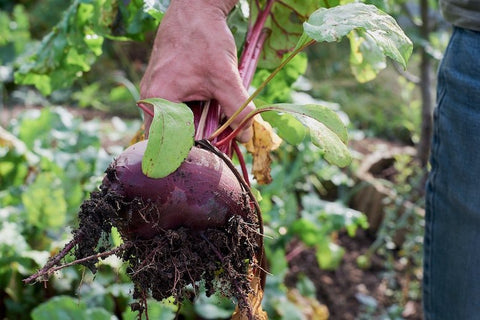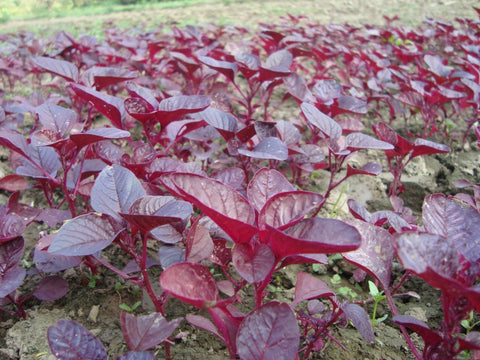Nitrate Rich Vegetables: Organic vs. Conventionally Grown
Are nitrate rich vegetables better organic or conventionally grown? Many prioritize eating organic vegetables to minimize exposure to harmful chemicals. From boxed foods to frozen and fresh local produce, organic is the default choice for a healthy lifestyle. The organic rule of thumb serves us in so many ways, but as in life, not everything is black and white. There is one category of produce with an exception to our organics-only rule. That exception is nitrate rich vegetables. When the goal is to increase our nitric oxide levels, conventionally grown beets and spinach contain more nitrate than organic–in some cases 10 to 1.
Many factors contribute to the effectiveness of nitrate rich vegetables on the cardiovascular system. Those factors include the region in which the produce is grown, the soil quality, amount of sunlight, time of harvest, and perhaps most importantly, the amount of nitrogen in the soil.
Unlike processed meats, the high nitrate levels in vegetables have been proven by thousands of studies to improve health. The higher our nitrate and nitrite levels from plants, the better our bodies can use these molecules to produce and boost nitric oxide.
Why we want nitrate-rich vegetables in our diet
Doctors are increasingly recommending a nitrate-rich diet for ongoing health, cardiovascular support, and sports nutrition. Dr. Louis Ignarro, one of the Nobel prize winners that discovered the benefits of nitric oxide on the cardiovascular system, is an advocate for natural supplementation of nitric oxide-boosting foods. High nitrate foods include beets, red spinach, almonds, and walnuts.
Dietary nitrates are present in many leafy greens and play a vital role in vascular and metabolic health. In particular, dietary nitrate increases nitric oxide levels, which help relax the smooth muscle on veins and arteries and transport oxygen and nutrients to all tissue throughout the body. This oxygen optimization is especially beneficial for athletes and anyone who exercises, as nitric oxide reduces the oxygen cost of high exertion exercise, increasing the tolerance for intense activity and performance i.e.more and longer lasting energy.
Nitric oxide vegetable benefits include:
- Boosting energy
- Improving cell communication, as nitric oxide is a neurotransmitter
- Supporting muscle building and athletic performance
- Relaxing smooth muscle and widening blood vessels
- Supporting lung health
- Increasing nutrient and oxygen availability
- Improving immune system response
- Maintaining optimal cell function and preventing cell damage
A diet rich in nitrate sourced from vegetables and not meat can have numerous health benefits. Consuming nitrate-rich vegetables in the quantities we need is the vital part, especially when balancing out the organic produce in our shopping cart. It will take an informed strategy to know which vegetables to source conventionally.
How dietary nitrates work in the body
Nitrate, nitrite, and nitric oxide are naturally occurring molecules that occur in soil, the air, and our bodies. Here’s the molecular makeup of various nitrogen molecules and how they break down:
- Nitrate is 1 nitrogen atom, 3 oxygen
- Nitrite is 1 nitrogen atom, 2 oxygen (an oxygen atom has been removed)
Nitrite can then turn into two things:
- Nitric oxide (which is what happens when we eat nitrate-rich vegetables) OR
- Nitrosamines (when nitrites and amines combine)
Nitrosamines are considered carcinogenic and often form in meats when preservatives are added. Here’s where things get even more interesting. Vegetables contain antioxidants, including vitamin C, which prevent nitrosamines from forming. It’s one of the main reasons researchers believe nitrates in vegetables are good for you in producing nitric oxide.
Nitrosamines are considered carcinogenic and often form in meats when preservatives are added. Here’s where things get even more interesting. Vegetables contain antioxidants, including vitamin C, which prevent nitrosamines from forming. It’s one of the main reasons researchers believe nitrates in vegetables are good for you in producing nitric oxide. Nitrate-rich vegetables contain ample antioxidants to block harmful chemicals from forming. Whereas processed meats that contain nitrite are dangerous to health, they contain sodium nitrate and lack the antioxidants necessary to protect our bodies from developing potentially cancer-causing ingredients.
There is an increased interest in understanding nitrates and their role in our health. It is important to know the difference between nitrates in vegetables versus nitrate from meat. Thousands of studies have been conducted on the health benefits of beetroot juice. Yet, this overlap hasn’t translated into a mainstream understanding of how vital beets, spinach, and other nitrate-rich vegetables are for supporting overall health.
The importance of conventionally grown beets and spinach

Eating organic vegetables and fruits remains important, but when it comes to nitrate rich vegetables that priority should shift if boosting nitric oxide is the goal. Numerous studies have examined the nutrient load of nitrate in conventional vs. organic beets. The outcome is that organic beets contain considerably less nitrate than conventionally grown, mainly as a result of nitrogen added to the soil.
One study in particular examined the impact of variables: nitrogen, potassium, phosphorus, and light intensity on nitrate concentration. Nitrogen fertilizer had the most significant influence on nitrate accumulation in all tissues studied. The factors that were found to increase nitrate levels in beets and spinach included:
- Increasing nitrogen in fertilizer
- Reducing light intensity
- Decreasing potassium
Other agricultural factors include atmospheric nitrogen by symbiotic bacteria and the reduction of nitrate to nitrite, also called "nitrate reductase activity" in the root.
The key takeaway about nitrate rich vegetables organic vs. conventionally grown

Many growing factors may contribute to the effectiveness of beets on the cardiovascular system, and perhaps most important is the amount of nitrogen in the soil. No doubt all beets are tasty and good for nutrition support. Still, without testing for nitrate levels, as done in the studies above, it won’t be clear how effective those beets could be for maintaining healthy circulation and boosting nitric oxide. Supplementation is recommended for optimal nitric oxide boost and should be sourced from clean functional food.
Resources
Cantliffe, D.J. (1973), Nitrate Accumulation in Table Beets and Spinach as Affected by Nitrogen, Phosphorus, and Potassium Nutrition and Light Intensity1. Agron. J., 65: 563-565. https://doi.org/10.2134/agronj1973.00021962006500040012x
Sweazea, K. L., Johnston, C. S., Miller, B., & Gumpricht, E. (2018). Nitrate-Rich Fruit and Vegetable Supplement Reduces Blood Pressure in Normotensive Healthy Young Males without Significantly Altering Flow-Mediated Vasodilation: A Randomized, Double-Blinded, Controlled Trial. Journal of nutrition and metabolism, 2018, 1729653. https://doi.org/10.1155/2018/1729653
Lidder, S., & Webb, A. J. (2013). Vascular effects of dietary nitrate (as found in green leafy vegetables and beetroot) via the nitrate-nitrite-nitric oxide pathway. British journal of clinical pharmacology, 75(3), 677–696. https://doi.org/10.1111/j.1365-2125.2012.04420.x
Ahrendt D. M. (2001). Ergogenic aids: counseling the athlete. American family physician, 63(5), 913–922. https://pubmed.ncbi.nlm.nih.gov/11261867/
Gold, L., Slone, T., Stern, B., Manley, N., & Ames, B. (1992). Rodent carcinogens: setting priorities Science, 258 (5080), 261-265 DOI: 10.1126/science.1411524
https://blogs.scientificamerican.com/science-sushi/httpblogsscientificamericancomscience-sushi20110718mythbusting-101-organic-farming-conventional-agriculture/#2
https://www.mayoclinic.org/healthy-lifestyle/nutrition-and-healthy-eating/expert-answers/sodium-nitrate/faq-20057848#:~:text=Sodium%20nitrate%2C%20a%20preservative%20that%27s,narrow%2C%20leading%20to%20heart%20disease





Comments (0)
There are no comments for this article. Be the first one to leave a message!